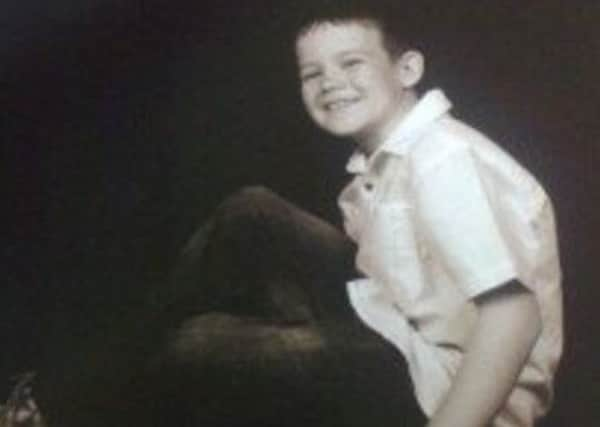Jake '˜was just a happy, lovely wee boy'


Peter and Leona Murphy described their Liverpool-supporting son, who died on July 7, 2013, as just a normal fun-loving 11-year-old.
“He was just a happy, lovely wee boy,” said Mrs Murphy.
“He entertained everybody and loved playing jokes.”
Mr Murphy said Jake loved playing football but had to play in goal due to a diagnosis of aortic valve stenosis - a narrowing of one of the heart valves - when he was six months old and later medical advice that he avoid all “strenuous sports” when he was eight years old.
Advertisement
Hide AdAdvertisement
Hide Ad“Jake didn’t actually play for a team. He wanted to,” said Mr Murphy.
Mrs Murphy told the inquest that when doctors warned against playing sports, Jake had asked her, “Why do I have to have a heart problem?”
Mr Murphy said he had understood Jake wasn’t able to play competitive sports but didn’t realise this extended to ordinary playground activities as well.
During the inquest Anne Finnegan, representing the Western Trust, said that between Jake’s diagnosis in November 20, 2003, and his death in 2013, he had been seen 18 times by Dr Andrew Sands at the cardiology centre at the Royal Victoria Hospital.
Advertisement
Hide AdAdvertisement
Hide AdAsked by Ms Finnegan if, during these consultations, Dr Sands had advised against physical activity, Mr Murphy said: “Yes. Strenuous sports.”
Ms Finnegan pointed to a note following an examination in July 2012, in which Dr Sands had written that he had “strongly advised” against exercise, specifically mentioning running and competitive sports.
Dr Sands had also written a medical letter to St Joseph’s College, where Jake was due to attend in September 2013, briefing them on his medical requirements, the inquest heard.
Asked by counsel for the family about their uncertainty over the level of physical activity Jake was able to engage in, Mr Murphy said he thought it was appropriate for him, “just to act like a young boy”.
Advertisement
Hide AdAdvertisement
Hide AdHe said: “Never was I told that Jake could drop dead running out on the street.”
Asked what he understood by “strenuous”, Mr Murphy said: “Strenuous sports. Boxing is strenuous, football is strenuous, it involves running about for 90 minutes, it takes a lot out of you.”
The inquest heard how Jake was playing on a building site in Shantallow on the evening of Sunday, July 7, 2013, when he collapsed.
Mr Murphy was returning to work when he was hailed by one of the building site guards who told him, “I think that’s your son”.
Advertisement
Hide AdAdvertisement
Hide Ad“To be honest with you I thought he had fainted, I didn’t think he was dead,” said Mr Murphy.
The inquest heard how Jake was given CPR until an ambulance arrived and that Mr and Mrs Murphy travelled to Altnagelvin with their son but by 9.30pm Jake was dead.
In his statement to the inquest Mr Murphy said that since Jake’s referral to the cardiology centre in March 2004, he had had difficulties making appointments and had also been dissatisfied with the timing of his son’s reviews.
Dr Andrew Sands reiterated how saddened he had been to hear of Jake’s death before outlining the history of his involvement since the patient’s referral in 2004.
Advertisement
Hide AdAdvertisement
Hide AdHe explained how over the years a narrowing of the heart valve was discernible and that he had cautioned against “vigorous exercise”.
Dr Sands said that in May 2009 cardiac catheterisation was performed but aortic valvuloplasty using a balloon to widen the valve was opted against because aortic gradient readings didn’t support it.
He said there was a reluctance to proceed with angioplasty on a patient as young as Jake as this could lead to a requirement for repeated open-heart surgical operations in future.
Dr Michael Rigby, a consultant paediatric cardiologist at Royal Brompton Hospital, said he viewed the management of the patient’s treatment as “completely satisfactory” and the six to nine monthly review intervals as “more than satisfactory”.
Advertisement
Hide AdAdvertisement
Hide AdDr Rigby warned of the danger of damaging the aortic valve by proceeding with balloon treatment.
“It is not an easy choice. You risk severely damaging the aortic valve,” said Dr Rigby.
He said this could then precipitate repeated open-heart surgeries.
He commented: “The pressures for people who work with children with heart disease, take my word for it, are immense”.
Advertisement
Hide AdAdvertisement
Hide AdDr Rigby said there was no perfect treatment for the condition and that medics tend to take a “conservative approach” if they think an intervention like aortic valvuloplasty could do more harm than good.
But Dr Rigby said that he likely would have gone for intervention with a balloon in Jake’s case.
Dr Sands told the inquest that Jake’s case has resulted in a reevaluation at the Belfast cardiology centre.
“I’m reviewing my criteria for intervention,” he said.
Dr Sands said clinicians are now often intervening earlier with smaller balloons.
Advertisement
Hide AdAdvertisement
Hide Ad“We’ve learned as a group from Jake’s case. Naturally we’re keen to learn from it,” he said.
The Coroner Joe McCrisken, describing Jake as a child who was “full of life who loved to play jokes and was good fun to be around,” said he died from left ventricular hypertrophy as a result of his suffering from aortic valve stenosis.
He said the decision by Dr Sands and his team not to proceed with angioplasty was conservative but not unreasonable.
“The decision not to perform the procedure was not unreasonable given the information they had,” the Coroner said.